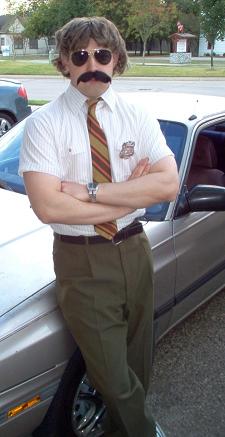U.K. Sets Up Sting To Catch Stores That Sell To Kids
Posted: Tue Apr 21, 2009 9:54 am
U.K. Sets Up Sting To Catch Stores That Sell To Kids
by Stephen Johnson

United Kingdom FlagAs part of a nationwide investigation, brave government agents in the United Kingdom recently set up a daring operation to determine whether retailers sell "mature" video games to underage kids. It turns out that some of them do.
The Trading Standards agency says most retailers tested sold "adult" games to an undercover teen. The teenage volunteer visited 16 separate outlets and found that a dozen of them sold games. Only U.K stores Gamestation, Game, PC World and WH Smith refused to sell the titles. The whole thing must have been like an episode of 21 Jump Street, except without Johnny Depp.
In England, The Video Recordings Act of 1984 says that shops which sell 18-rated videogames to anyone below that age can face fines of up to £5000, and proprietors can face up to six-months in prison. The government of the U.K. is not happy. According to a Trading Standards spokesperson, “It is very disappointing that so many large retailers have ignored their own systems in regard to restricted video game sales,”
Interestingly, the Trading Standards spokesperson lauded (presumably different) U.K. retailers for their good compliance in keeping youngsters from buying tobacco products. Which leads to interesting questions: Why are retailers keeping kids from smoking and not keeping them from playing video games? Does this mean that the U.K's relatively strict laws to prevent kids from playing mature games should be changed? Or that video game stores have to sell "mature" games to kids in order to stay afloat? Or could it be that there is some unspoken assumption among retailers that games are less harmful to kids than smoking? Or maybe it's just that game retailers are not used to trying to prevent customers from buying certain products the way sellers of liquor or cigarettes are?
by Stephen Johnson

United Kingdom FlagAs part of a nationwide investigation, brave government agents in the United Kingdom recently set up a daring operation to determine whether retailers sell "mature" video games to underage kids. It turns out that some of them do.
The Trading Standards agency says most retailers tested sold "adult" games to an undercover teen. The teenage volunteer visited 16 separate outlets and found that a dozen of them sold games. Only U.K stores Gamestation, Game, PC World and WH Smith refused to sell the titles. The whole thing must have been like an episode of 21 Jump Street, except without Johnny Depp.
In England, The Video Recordings Act of 1984 says that shops which sell 18-rated videogames to anyone below that age can face fines of up to £5000, and proprietors can face up to six-months in prison. The government of the U.K. is not happy. According to a Trading Standards spokesperson, “It is very disappointing that so many large retailers have ignored their own systems in regard to restricted video game sales,”
Interestingly, the Trading Standards spokesperson lauded (presumably different) U.K. retailers for their good compliance in keeping youngsters from buying tobacco products. Which leads to interesting questions: Why are retailers keeping kids from smoking and not keeping them from playing video games? Does this mean that the U.K's relatively strict laws to prevent kids from playing mature games should be changed? Or that video game stores have to sell "mature" games to kids in order to stay afloat? Or could it be that there is some unspoken assumption among retailers that games are less harmful to kids than smoking? Or maybe it's just that game retailers are not used to trying to prevent customers from buying certain products the way sellers of liquor or cigarettes are?